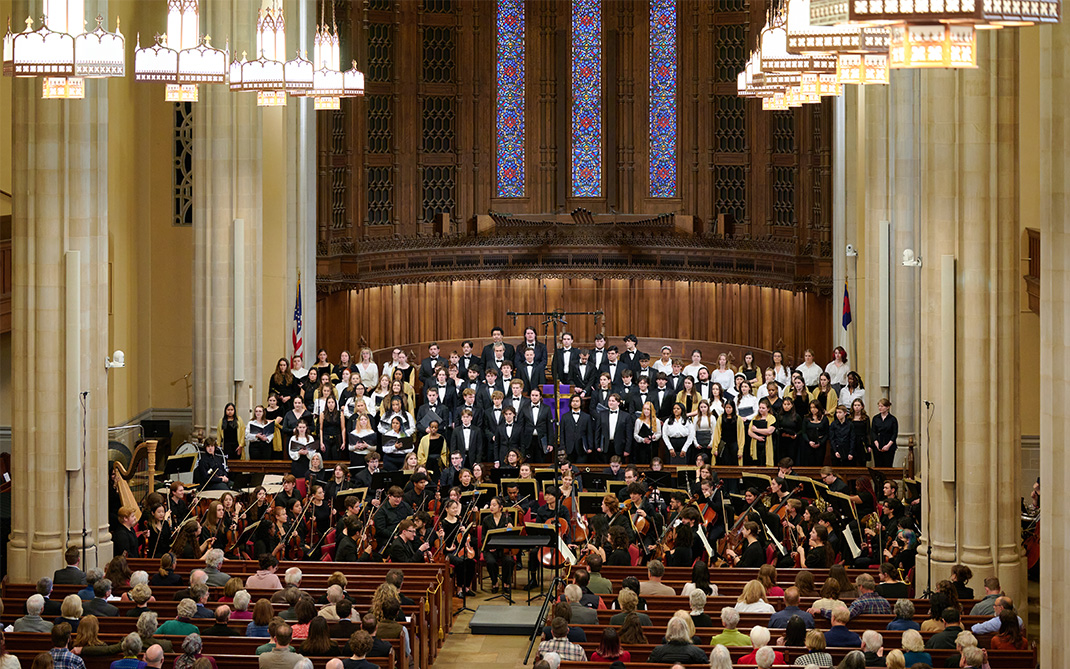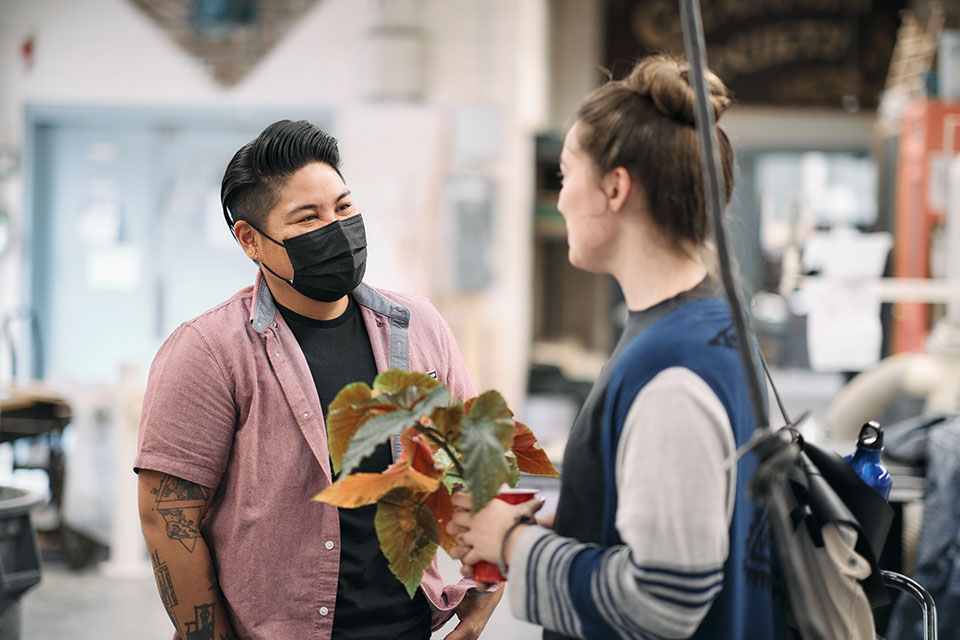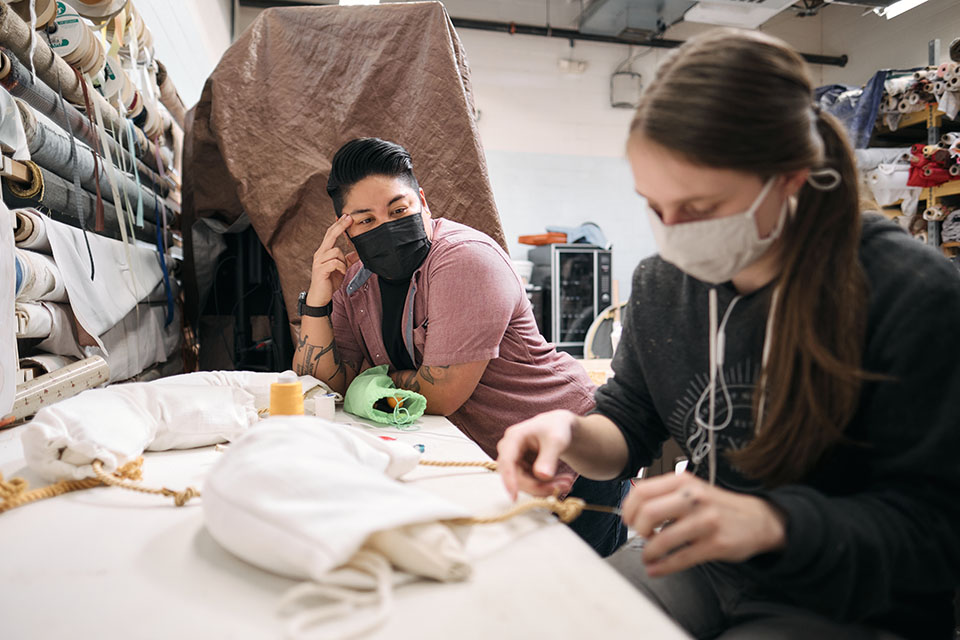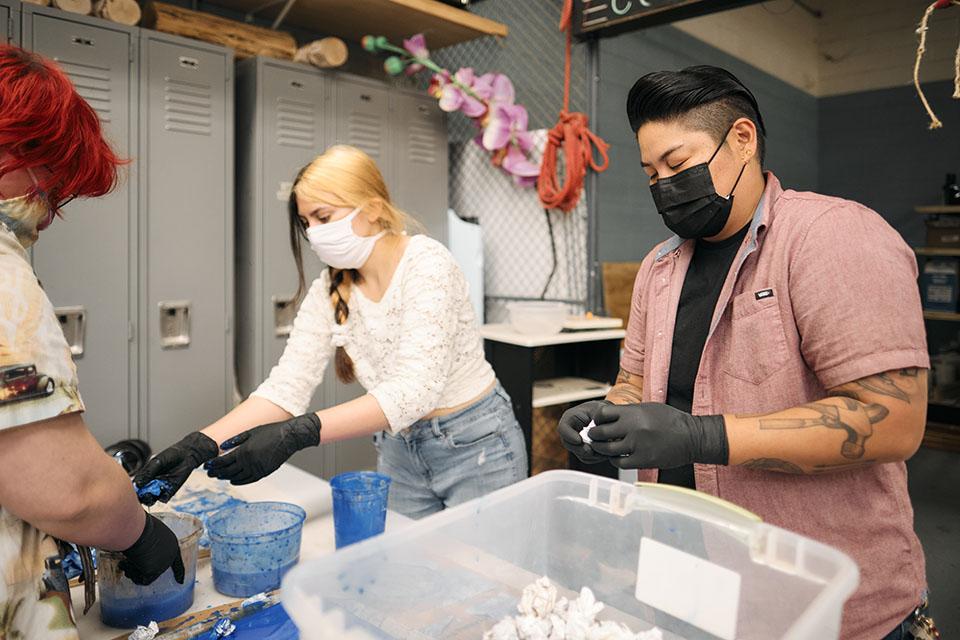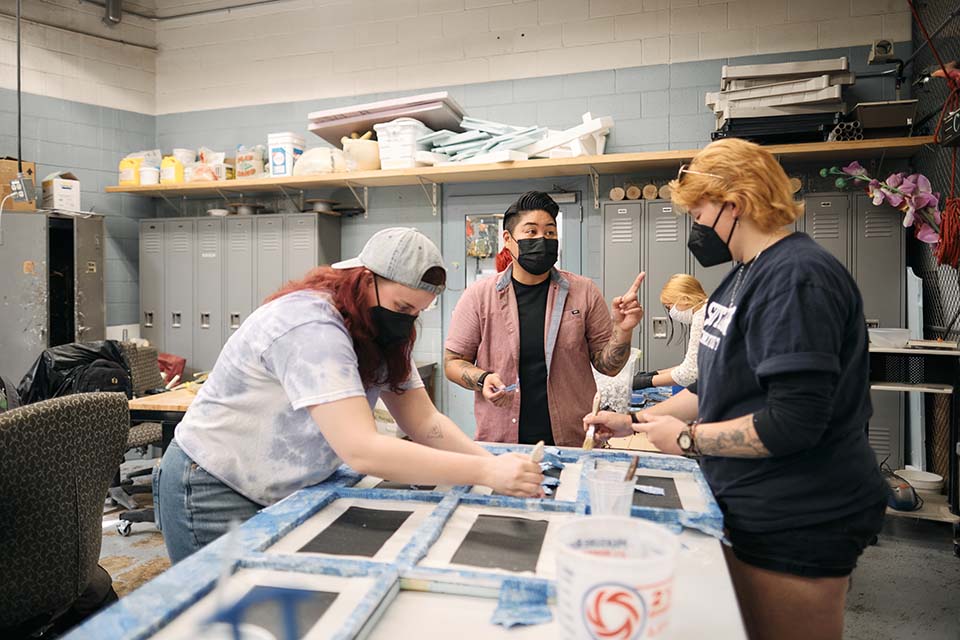Stage Properties has made life endlessly interesting for Kris Julio
“I am constantly aware of how important it is to be the example and representation for my students that I needed in the early stages of my career,” says Design and Production faculty member Kris Julio. “I do my best to be my authentic self and to advise my students to be themselves in everything they do.”
As Director of the Stage Properties concentration, Julio guides students as they create props for plays, musicals, operas and occasionally dance pieces and films. He describes stage properties work as “part skill, part resourcefulness and all curiosity.” Fortunately for Julio, he has all of those qualities in abundance.
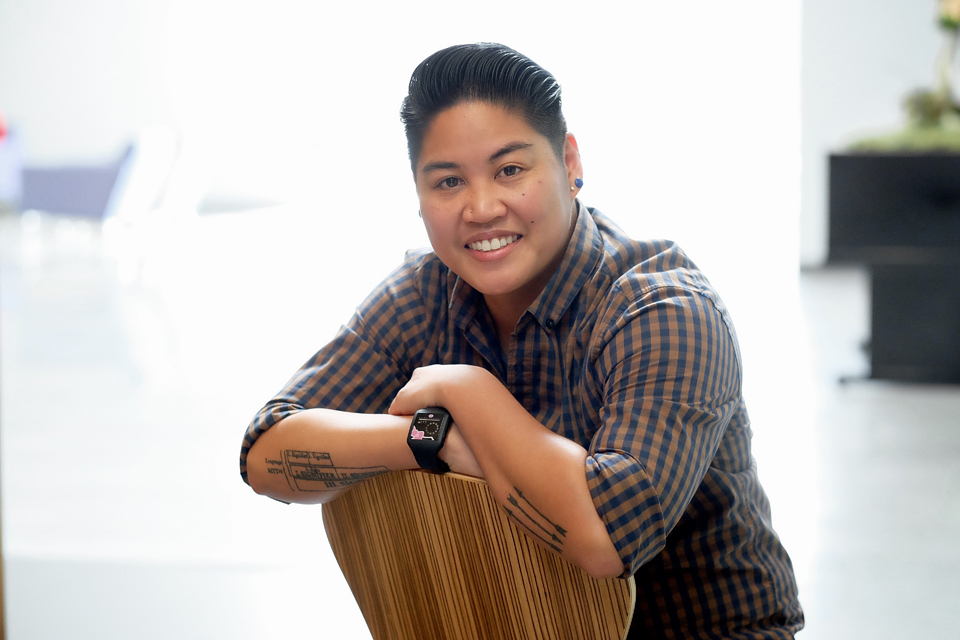
Director of Stage Properties Kris Julio
Julio started his theater career as a competitive thespian in high school and, through exploration and willingness to try new things in college and beyond, ultimately found his way into props.
Now, as a faculty member at his alma mater (M.F.A. '13), that thirst for knowledge and love of storytelling serves him well. Here, he reflects on his theater journey, his responsibility to the next generation of theater-makers and the ever-evolving industry he calls home.
Discovering a path
Originally from Torrance, California, Julio's love of all things theater started in high school. "My very true story is that my mom turned to me before my freshman year of high school and said, 'You need to make friends; I'm signing you up for drama,'" he laughs. "And it worked."
"I did drama for four years in high school, which included both acting and a heavy focus on script analysis," he adds. “When I arrived at U.C. Santa Cruz, I realized that while I had done well in high school, drama had been the only thing I really enjoyed, so I decided to major in theater."
A first-generation Filipino-American, Julio explains that while choosing what path to take in theater, he never really seriously considered being an actor because he didn’t see a lot of other Filipino actors in films and television or on stage at the time. “With a few exceptions, I didn’t see a lot of roles out there that felt like they were written for someone like me,” explains Julio.
Since his high school theater background was from more of a literary and dramaturgical standpoint, he felt a natural progression was a theater degree where he got to dabble in a little bit of everything. "I took every performance theory and scene design course. I was a designer, in a guerilla theater troupe, did some clown work and movement, and worked in the scene shop for a while. I was a house, stage and production manager, a teaching assistant, and I also wrote a couple of plays that came to fruition. I produced festivals and led student organizations and I started to meld the things I loved about community engagement and drawing people out through storytelling in a really comfortable environment."
Seeing productions come to life...really changed my outlook on how different elements of theater worked together.
Kris Julio
Throughout all of his classes, scene design first caught his attention and was his gateway to focusing on technical theater. “I had a professor, Kate Edmunds, who took me under her wing and introduced me to design. As the child of an architectural designer and draftsman, drawing designs and building models felt both familiar and new at the same time,” explains Julio.
In the summers, he worked with Santa Cruz Shakespeare (formerly known as Shakespeare Santa Cruz), where he could continue his exploration of technical skills. At an internship at A.C.T. in San Francisco, his interests began to solidify.
"Seeing productions come to life at A.C.T. really changed my outlook on how different elements of theater worked together,” explains Julio. “You could tell that every detail mattered, and I knew that you could take pride in making something that helped tell a really powerful and impactful story."
And he realized the work brought together many of his interests and notes that throughout his career, he has tried to combine technical aspects and community engagement. “While working at A.C.T., I was also working part-time teaching at an Oakland-based non-profit feminist organization. In my internship, I was mentored by everyone in the prop shop, including a classically trained furniture carpenter and encouraged to pursue prop-making. I realized that props combined the worlds of storytelling, semiotics and making, which I'd never tapped into before."
Stage properties at UNCSA
Once he'd decided on a career path, he wasn't sure what came next. It turns out his mentors and colleagues had a suggestion — go to graduate school.
"At Shakespeare Santa Cruz, half of the people I worked with were from UNCSA," he said. "My friends convinced me to meet with Bland Wade. A lot of other programs at the other schools were started by his students, so why not go to the place where it all started?" Wade, then Director of Stage Properties, founded the concentration at UNCSA. When Julio met with him, the decision was clear.
As a student, the shop was small. It was roughly a fourth the size of the current shop, and, as such, required clear communication and a team spirit — both skills that Julio has returned to constantly in his props career and as a teacher.
"We had to talk to each other a ton," he says. "There were limited resources and it meant that we all held each other immediately accountable for things. We had to work as a cohesive group and show up for each other," he says. He's close friends with many of those classmates still.
Those experiences have been informative to him as an instructor in the same concentration where he learned and now has the opportunity to teach.
From student to teacher
Julio finished graduate school in 2013 and immediately launched into a career, working, among other jobs, at Santa Fe Opera (where he's returned several times) and on a national tour of Disney's "Beauty and the Beast." As he wrapped up his work on tour in the spring of 2015, he got an unexpected call.
"Bland called me before a two-show day and said, 'What are you doing next year? Do you want to come back and teach?'" recalls Julio. The props department had added a teaching position. For Julio, teaching was a dream he didn’t think he would be able to realize for several years to come.
He was sold when Wade told him, "The coolest thing about coming back is that you get to learn alongside your students. And you're in an environment that's will keep you constantly engaged and flexible." He returned to the school and, in 2020, Julio was named director of the concentration. "I get to work with my favorite people every day."
And he's been able to watch the props department evolve in exciting ways from his days as a graduate student to now-director of the program.
"With how much our concentration has expanded, it's given us the freedom to organize things better and let the students have more agency in niche interests," he says. "It's the idea that you get as much out of this education as what you put into it. Our students now have a little more customization."
That customization often takes the form of independent studies courses, with topics ranging from dollhouse miniatures to knife smithing, historic table settings to haunted houses and horror props. Those special topics are also an opportunity for Julio to learn new skills — and help balance the dynamic between student and instructor.
Approach to teaching
In Julio's work as an instructor, he thinks a lot about his experience as a student and young person. He focuses on listening to the students and meeting them where they are, aiming to provide them with the understanding he gained as a student and as a queer person of color.
"As a shy kid, theater drew me out, gave me a place to call home and gave me a tool and vehicle to tell stories that I think are important and need to share," he says. "So, as a teacher coming back, a huge part of that has been authentically representing the thing I didn't have in my own education. Representation matters."
“It wasn't until I was a graduate student at UNCSA that I had a teacher who looked like me. I know that, while it is important for me to have good technical skills and communication, it is also important for me to show up and show my students how to live authentically,” he adds.
When talking about his teaching style, Julio explains that since there are so many different skills and aspects to props, he is often learning something alongside his students. "There are times where we as props faculty will say, 'I'm not an expert, but let's figure it out together.' The students don't have to see themselves at a lower level than their faculty. That immediately builds the type of collegiality we want to promote in our shop. Anyone can be a mentor and anyone can be a student."
That statement took a new meaning this past summer as Julio returned to the Santa Fe Opera as a staff carpenter and got to work alongside many of his students. “Getting to work with some of my students as a colleague is fun because I get to see them putting what we learn every day into practice at work.”
Ultimately, Julio's focus on diversity in and out of the classroom and his commitment to authentic storytelling have shaped his eight years as a faculty member. "In the arts in general, diversity is at the forefront of a lot of important conversations," he adds. "For me, it's kind of a no-brainer. Don't we want to tell stories that make people feel seen?
Get the best news, performance and alumni stories from UNCSA.
SUBSCRIBE TO OUR NEWSLETTERS(OPENS IN NEW TAB)(OPENS IN NEW TAB)
December 09, 2022
